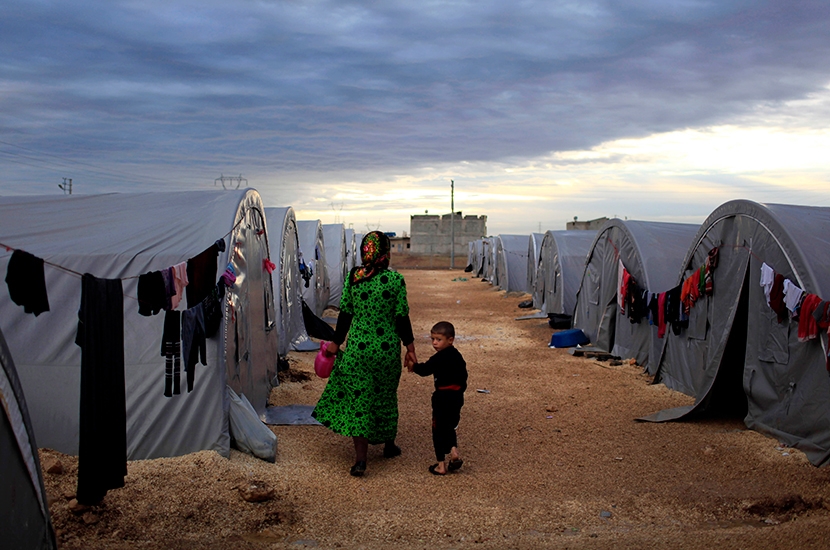For years now, the British government has prided itself on how much money it gives away in foreign aid. But of course it’s not just the amount that matters — it’s how effective it is. Now that the Prime Minister is to wrap the Department for International Development back into the Foreign Office, it’s a chance for us to ask again: who are we as a country? What are our values? And how can we ensure that taxpayers’ money is well spent?
It can be difficult to ensure that a recipient of aid is legitimate and worthy. That’s why there’s been a tendency for the UK and aid agencies to rely on giving to foreign governments and their bureaucracies.

But in doing this we’ve risked sending good money after bad: losing it amid suffocating bureaucracy, inefficiency and outright corruption. In Pakistan, for example, a large chunk of educational aid is in danger of being wasted because DfID-related contractors have built substandard school buildings which may need replacing. I have also asked repeatedly, without satisfactory response, whether any of Britain’s educational aid to Pakistan might be being used to continue producing textbooks which promote religious hatred. There seems little independent monitoring of textbook revision, and even those responsible for it have told me that as soon as they remove the teaching of hate from one set of books, it breaks out somewhere else.
About a third of the UK development budget is given to other aid agencies, such as the UN. Once again, we need to ask: how is this money spent? It has been well documented, for example, that Christian refugees from Iraq and Syria are generally absent from UN-run camps in Jordan, the Lebanon and Turkey because these can be controlled by Islamists who insist on compliance with Sharia to gain admission. In Africa and elsewhere, some UN and other agencies are also known to promote radical programmes on matters like abortion which may be little related to life-enhancing projects such as food security or sanitation for the very poor.
It’s absolutely right that Britain helps the Rohingya Muslims, but why not Christians in Iraq, Syria or Pakistan?
Very often, faith-based organisations are at the forefront of emergency relief and also longer-term development on the ground. But they are not well funded, leaving them unable to provide for necessities. When I visited Iraq after the Isis occupation of large parts of the north, as part of a delegation organised by the charity Aid to the Church in Need, I found the Chaldean Catholic Church hugely involved in refugee relief and rehabilitation not just for the large numbers of Christian refugees, but also for Yazidis and even some Muslim groups. I was told that the Church was receiving assistance from church-related aid agencies but that western governments and multilateral agencies had kept their distance because they were afraid of being charged with discriminating in favour of Christians and, therefore, against other religious groups.
Such a ‘faith blind’ approach fails to help the very people who have been subjected to religious persecution which amounts to genocide, on the basis of an alleged neutrality. Taking another example, when I attempted to interest DfID in helping Christian-run schools for the poorest in Pakistan. I was once again faced with reluctance in dealing with faith communities, especially if they are Christian, even though Christian pupils face discrimination and exclusion in government schools. It is absolutely right that Britain is helping the Rohingya Muslims who are victims of attempted genocide, but why not Christians in Iraq, Syria or Pakistan? As the Bishop of Truro’s report to the FCO says, we cannot continue channelling aid through UN and other agencies which fail to ensure that communities suffering because of their faith receive due recognition for it in the distribution of assistance.
Churches and other faith communities are often involved in delivering significant literacy, public health, food and family education programmes. They may work on their own or in partnership with local NGOs or with agencies based in this country. It must be right to cooperate with them and with their partners directly in the knowledge that funds will be responsibly used and that accountability will be at a scale easier to assess than with the mega budgets of government departments and their agencies.
One area of assistance where it is appropriate to deal with governments is in the reform of law and law enforcement. The Asia Bibi case in Pakistan has revealed to the world the widespread abuse of blasphemy law to target religious minorities and settle personal scores. Although some Muslims have argued that the law in its present form needs to be repealed for Islamic reasons, it is certainly the case that police reporting procedures, the decision to prosecute and the modes of trial and appeal can all be reviewed and reformed. British legal assistance in this and other areas could play a vital role in promoting freedom of religion or belief.
I understand that this summer there is to be an ‘integrated review’ of how the two government departments are to come together. It is most important that this review results in the knowledge of good development practice both being focused in the new department and permeating every aspect of its work, including that of the diplomatic posts abroad. Part of the focusing could include a dedicated minister for development, and a senior ‘champion’ at director-general level among the civil servants. Permeation should include training of staff at posts abroad on development and human rights issues, particularly those relating to ethnic and religious minorities, as well as the monitoring of how relief, development and freedom of religion or belief issues are being addressed at each post. If this happens, there is the possibility of Britain having not only an integrated foreign policy, but one which is both just and fair and able to safeguard legitimate British interests and values.
The Right Revd Dr Michael Nazir-Ali is a former Bishop of Rochester, and president of the Oxford Centre for Training, Research, Advocacy and Dialogue.






Comments